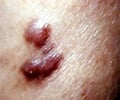Blood-forming stem cells can be modified with a CAR therapy that can safely engraft in the bone marrow.

TOP INSIGHT
Gene therapy was used to engineer blood-forming stem cells to carry chimeric antigen receptor (CAR) genes to make cells that can detect and destroy HIV-infected cells.
Antiviral drugs can suppress the amount of HIV in the body to nearly undetectable levels, but only an effective immune response can eradicate the virus. Researchers have been seeking a way to improve the body's ability to combat the virus by engineering blood-forming stem cells to specifically target and kill HIV-infected cells for the life of the individual. Although chimeric antigen receptor (CAR) T-cells have emerged as a powerful immunotherapy for various forms of cancer - and show promise in treating HIV-1 infection - the therapy may not impart long-lasting immunity. Researchers, physicians and patients need T cell-based products that can respond to malignant or infected cells that may reappear months or years after treatment.
METHOD
Because HIV uses CD4 to infect cells, the researchers used a CAR molecule that hijacks the essential interaction between HIV and the cell surface molecule CD4 to make stem cell-derived T-cells target infected cells. When the CD4 on the CAR molecule binds to HIV, other regions of the CAR molecule signal the cell to become activated and kill the HIV infected cell. The researchers found that, in test animals, modification of the blood-forming stem cells resulted in more than two years of stable production of CAR-expressing cells without any adverse effects. In addition, these cells were widely distributed throughout the lymphoid tissues and gastrointestinal tract, which are major anatomic sites for HIV replication and persistence in infected people. Most important, engineered CAR T-cells showed efficacy in attacking and killing HIV-infected cells.
IMPACT
 MEDINDIA
MEDINDIA




 Email
Email









